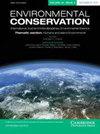'......我以水创造万物':水资源保护与《古兰经
IF 2.6
3区 环境科学与生态学
Q2 BIODIVERSITY CONSERVATION
引用次数: 0
摘要
摘要 节水对于干旱地区,包括许多穆斯林占多数的国家尤为重要。在人类人口增长和扩张以及全球气候变化的双重压力下,节水工作对于延长现有水源的寿命以及寻找符合宗教信仰的水处理方法来说势在必行。我们回顾了《古兰经》中涉及用水和节水的经文。我们在法赫德国王古兰经印刷中心和沙特国王大学电子莫沙夫项目的英文译本中搜索了与水和节水有关的古兰经文。共找到 25 节与创世、农业用水、粮食供应/生产以及作为人类共同资源的水有关的经文。古兰经》经文鼓励人们感恩水,并明智地管理这一资源。没有发现禁止重复使用水(如经过处理的水)的具体规定,最近的伊斯兰文献支持使用经过净化的灰水。因此,经过处理的中水可以成为满足农业需求的额外水源,从而减轻本已有限的供水压力。节约用水是《古兰经》的规定。本文章由计算机程序翻译,如有差异,请以英文原文为准。
‘… And We have made from water every living thing’: water conservation and the Holy Qur’an
Summary Water conservation is of particular importance for arid regions, including many Muslim-majority countries. With the added pressures of human population growth and expansion and global climate change, water conservation efforts are imperative to extending the life of current water supplies as well as to sourcing water treatment methods that are religiously congruent. We review Qur’anic verses that address water usage and conservation. We searched the English translations of the King Fahd Complex for the Printing of the Holy Qur’an and the King Saud University Electronic Moshaf Project for Qur’anic scripture related to water and water conservation. A total of 25 verses were found that related to creation, water usage for agriculture and food provision/production and as a common resource for humanity. Qur’anic scripture encourages gratitude for water and wise stewardship of this resource. Specific prohibitions against the reuse of water (e.g., treated water) were not found, and recent Islamic literature supports the use of cleansed greywater. Treated greywater may thus be an additional source for agricultural needs, thus reducing the stress placed on already limited water supplies. Water conservation falls within Qur’anic scripture.
求助全文
通过发布文献求助,成功后即可免费获取论文全文。
去求助
来源期刊

Environmental Conservation
环境科学-环境科学
CiteScore
5.20
自引率
3.70%
发文量
43
审稿时长
>36 weeks
期刊介绍:
Environmental Conservation is one of the longest-standing, most highly-cited of the interdisciplinary environmental science journals. It includes research papers, reports, comments, subject reviews, and book reviews addressing environmental policy, practice, and natural and social science of environmental concern at the global level, informed by rigorous local level case studies. The journal"s scope is very broad, including issues in human institutions, ecosystem change, resource utilisation, terrestrial biomes, aquatic systems, and coastal and land use management. Environmental Conservation is essential reading for all environmentalists, managers, consultants, agency workers and scientists wishing to keep abreast of current developments in environmental science.
 求助内容:
求助内容: 应助结果提醒方式:
应助结果提醒方式:


